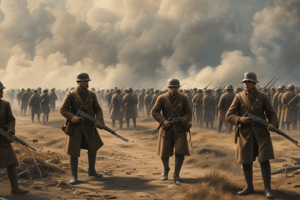Podcast
Questions and Answers
What strategic consequence did the Treaty of Brest-Litovsk have for Russia?
What strategic consequence did the Treaty of Brest-Litovsk have for Russia?
- It significantly weakened Russia's geopolitical position and diminished its international prestige. (correct)
- It enabled Russia to focus on domestic affairs, strengthening its internal stability.
- It fostered a strong relationship with the Western Allies, ensuring Russia's post-war security.
- It led to a close alliance with the Central Powers, securing Russia's interests in Eastern Europe.
What was the primary factor contributing to the failure of Germany's Spring Offensive in 1918?
What was the primary factor contributing to the failure of Germany's Spring Offensive in 1918?
- The strategic alliance formed between the Allied powers and Russia, providing a united front.
- The successful implementation of the Schlieffen Plan by the Allied forces.
- The superior military capabilities of the French and British armies, leading to their decisive victory. (correct)
- The widespread unrest and internal instability within Germany due to the British Blockade.
What was the main reason for the abdication of Kaiser Wilhelm II in November 1918?
What was the main reason for the abdication of Kaiser Wilhelm II in November 1918?
- The growing unrest and opposition within Germany, coupled with the Allies' refusal to negotiate with him. (correct)
- The successful outcome of the Spring Offensive, securing a decisive victory against the Allies.
- The overwhelming public support for the Social Democratic Party's agenda.
- The successful implementation of a peace treaty with the Allied powers, ending the war on favorable terms.
What was the main sentiment expressed in Friedrich Ebert's quote, “I hate war as only a soldier who has lived it can, only as one who has seen its brutality, its futility, its stupidity.”
What was the main sentiment expressed in Friedrich Ebert's quote, “I hate war as only a soldier who has lived it can, only as one who has seen its brutality, its futility, its stupidity.”
How did the British Blockade impact Germany during World War I?
How did the British Blockade impact Germany during World War I?
Flashcards
Treaty of Brest-Litovsk
Treaty of Brest-Litovsk
The treaty signed on 3 March 1918 marking Russia’s exit from WW1, resulting in significant territorial losses.
Spring Offensive
Spring Offensive
Germany's last major offensive on 21 March 1918 aimed to defeat British and French forces in WW1.
Kaiser Wilhelm II abdication
Kaiser Wilhelm II abdication
The event on 9 November 1918 when Kaiser Wilhelm II resigned during Germany's political upheaval.
Social Democrats
Social Democrats
Signup and view all the flashcards
Weimar Republic
Weimar Republic
Signup and view all the flashcards
Study Notes
Treaty of Brest-Litovsk (3 March 1918)
- Russia formally withdrew from World War I.
- Significant territorial concessions to the Central Powers (Germany, Austria-Hungary, Ottoman Empire, Bulgaria) occurred.
- Russia ceded Ukraine, Belarus, and the Baltic states.
- This isolated the Bolshevik government from Allied powers.
- Russia suffered a weakened geopolitical position and diminished prestige.
- The treaty influenced future Eastern European borders.
- It engendered suspicion towards the Bolshevik regime internationally, impacting Russia's post-war relations.
German Spring Offensive (21 March 1918) and Aftermath
- Germany's final major offensive on the Western Front failed.
- War weariness and internal unrest fueled by the British blockade caused widespread shortages and hunger in Germany.
- Kaiser Wilhelm II's popularity declined due to wartime exhaustion and growing political opposition.
- The Allies refused armistice while Wilhelm remained Kaiser, escalating the situation.
- The Armistice of Compiègne occurred.
German Abdication and Political Transition (9 November 1918)
- Kaiser Wilhelm II abdicated the throne.
- The Social Democrats, led by Friedrich Ebert, emerged as the preferred replacement government due to their anti-war stance.
- Ebert, later President of the Weimar Republic, highlighted the desire for peace and change, "I hate war as only a soldier who has lived it can, only as one who has seen its brutality, its futility, its stupidity."
- This encapsulates the political shift and Germany's desire for stability in its uncertain future.
Studying That Suits You
Use AI to generate personalized quizzes and flashcards to suit your learning preferences.




